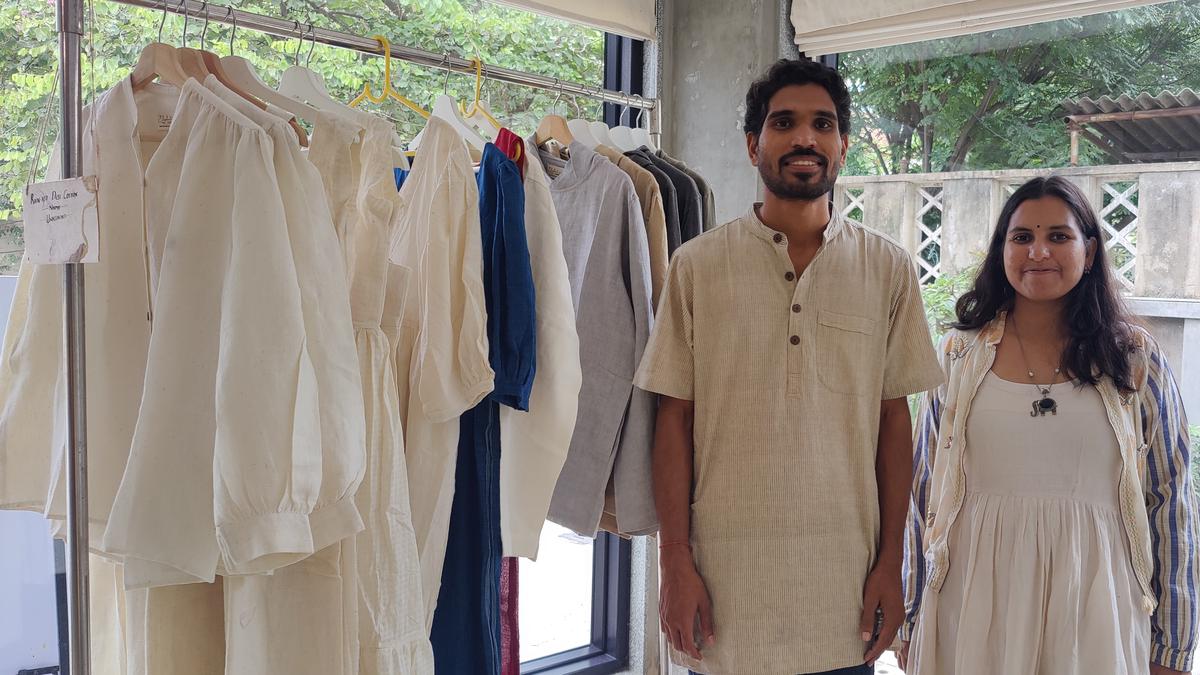
Telugu couple Alankrutha Chandra and Meher Gundavarum trade their techie jobs to embrace sustainable farming and clothing
The Hindu
Telugu couple Alankrutha Chandra and Meher Gundavarum trade their techie jobs to embrace sustainable farming in Warangal, and establish a clothing label, ‘Elephant in You’
The first lockdown, in 2020, proved to be a tipping point for Alankrutha Chandra and Meher Gundavarum, techies working in Chicago, USA. They returned to India and took up farming in Meher’s native town, Warangal, in Telangana. “Food, shelter and clothing are the basic necessities and we are trying, one step at a time, to lead a planet-friendly lifestyle,” says Meher. Their nascent clothing label named Elephant in You, the produce that grows on their chemical-free farm, and a farm stay that is being set up are all a step in that direction.
The couple was in Hyderabad recently for the monthly Biodegradable Santha at the Crafts Council of Telangana premises. On view were some of their ready-to-wear collection in unbleached organic cotton, linen and hemp fabrics that used natural dyes. All this is a progression of the plastic-free lifestyle they had followed for a few years, says Alankrutha.
They met while working in the US and hav been living together. “We avoided using plastics but had not done anything else to claim we were planet-friendly. Until the lockdown, I had not even grown a plant from a seed,” she says. After Meher gifted her a hydroponic set, she began growing herbs and vegetables. “Each day, I would wake up and check on the plants. It made me happy,” she recounts.
That step was a reminder of the lifestyle of Meher’s family in Warangal and her family in Tenali. Hailing from an agricultural background, Meher was privy to both the joys and challenges of farm life. He observed how several relatives had gradually given up agriculture, unable to cope with the high costs. Meher’s parents too had moved to the city to set up a bakery, but they still retained a patch of land back home.
Alankrutha took the first step and suggested they return to India to take up farming. “It took me six months to process the idea,” confesses Meher. “In my younger days, I never enjoyed visiting the farm since I was not used to roughing it out.” He was also aware that financially it would be a leap of faith to leave their well-paying jobs and start from scratch.
Alankrutha was the first to return to India, and Meher followed suit a year later. They got married and decided to embrace the farm life. “We thought we would have things in control in a few months. But a month later, Meher’s parents had to step in to guide us,” she recalls.
The farm now has 40 varieties of fruit trees (10 varieties of mangoes, three varieties of guava, pomegranate, sapodilla (sapota), sweet lemon (mosambi), Java plum (jamun), lemons, star fruit, avocado, Singapore cherry and more, pulses such as pigeon pea (toor dal), green gram (moong dal), black gram (urad dal), Bengal gram (chana dal), legumes like cowpea, (lobia), peanuts, and the oilseed sesame as well as seasonal vegetables and three varieties of indigenous rice. “We understood why people hesitate to do chemical-free farming. For example, getting chemical manure and pesticides is far simpler than preparing your jeevamrutham. You need cows for manure, you have to tend to them, and preparing the manure takes time; you need to repeat the process each week,” says Meher.













